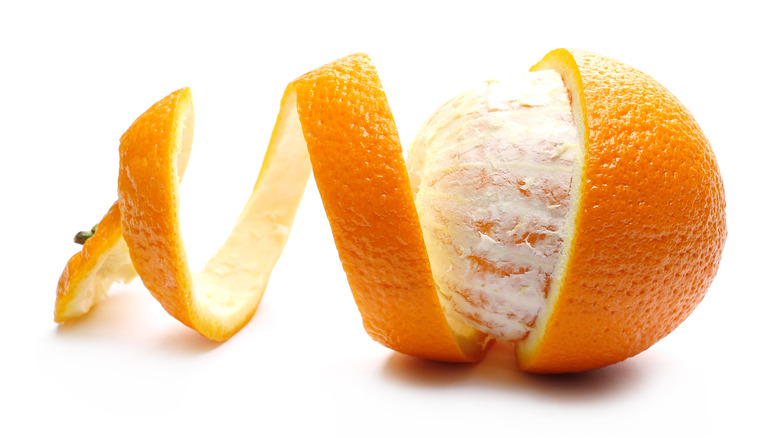The Unexpected Kitchen Tool That Makes Amazing Citrus Twists
If you've ever sat at a bar, you've seen firsthand all the different types of tools mixologists use to make cocktails. From cocktail shakers and strainers to jiggers and muddlers, bartenders rely on a whole toolbox of gadgets and gizmos. Are fruity drinks your kryptonite or do you prefer classic cocktails? Either way, you may have seen the mixologist use a Y-peeler, a slim and extremely sharp tool that allows bartenders to shave a fruit's peel for garnishing drinks like an Aperol spritz or Old Fashioned. However, it turns out Y-peelers can be super dangerous to use, even for seasoned pros.
One Portland-based mixologist told Epicurious that Y-peeler injuries are a common occurrence among bartenders, which is why some choose to wear cut-resistant gloves. One of his injuries was so bad that he had to seek medical attention. But wearing gloves can slow a bartender down, which isn't ideal when you're backed up on drink orders. So, what's a bartender to do? The mixologist recommends ditching the Y-peeler for a Boska cheese slicer instead. Not only is it safer, but its cut and design makes for a fancier, twistier peel. The spatula-looking part of the slicer offers more protection for the fingers and fingertips than an open Y-peeler. You still need to handle the tool with care — it has a sharp blade, after all.
Use leftover fruit peels for cleaning, food, and skincare
Because bartenders are consistently making cocktails night after night, they probably don't have to worry about using up leftover fruit slices, wedges, and peels. But if you're peeling an orange or lemon to garnish your homemade boozy beverage, there's a strong chance you won't use all of the peel. Fortunately, there are a ton of ways you can utilize fruit peel remains around the house, from cooking to skincare.
Treehugger recommends using lemon juice and peels to remove stubborn grease stains and clean glass coffee pots and tea kettles. Citrus is also a great way to spruce up meals, especially salads — you can turn leftover peels into extract powder, lemon pepper, citrus sugar, and citrus flavored olive oil.
According to Healthshots, orange peels have an excellent dose of vitamin C, which promotes healthy skin and can help kick acne and oiliness to the curb. Try using orange peels to make homemade skin scrubs, face masks, and face wash. Rubbing a lemon peel on your face can hydrate skin and fight against pigmentation and dark spots, per The Good Stuff Botanicals. You can even apply lemon juice to help alleviate blackheads, though Healthline notes the acidic nature of citrus can irritate some people's skin. So think twice before you toss out unused fruit peels at the end of the night. Treat yourself to a fruity cocktail followed by a rejuvenating face mask!

